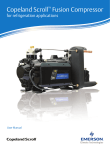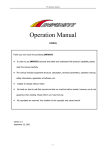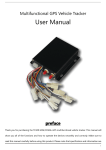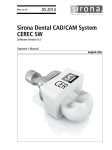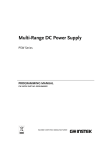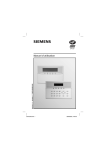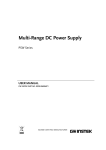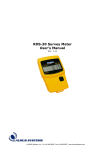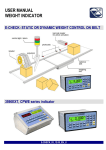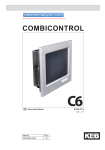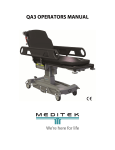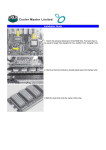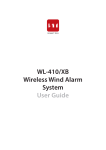Download YZ-250 User Manual
Transcript
DVCM130323V1 CONTENTS 1.0 DESCRIPTION…………………………………………………………………………………1 2.0 INSTALLATION………………………………………………………………………………2 3.0 LOADING OF PRODUCT…………………………………………………………………2 4.0 COINAGE…………………………………………………………………………………………4 5.0 REFRIGERATION……………………………………………………………………………4 6.0 PROGRAMMING………………………………………………………………………………6 6.1 MANUAL TUBE FILLING(FILL COIN)………………………………………………7 6.2 PRICE SETTING (SET PRICE)…………………………………………………………7 6.3 SINGLE MOTOR TEST (SINGLE SELECTION)……………………………….8 6.4TEST ALL MOTORS (ALL SELECTION)………………………………………….8 6.5 ACCOUNTABILITY (ACCOUNT)………………………………………………………9 6.6 VEND OPTIONS (OPTIONS PUSH[#])……………………………………………….…10 7.0 CLEANING……………………………………………………………………………………21 8.0 MAINTAINANCE……………………………………………………………………………21 9.0 NOISE………………………………………………………………………………………….22 10.0 RESTRICTIONS OF USE………………………………………………………………22 11.0 IMPORTANT SAFEGUARDS…………………………………………………………22 APPENDIX TROUBLESHOOTING…………………………………………………………25 DVCM130323V1 1.0 Description This machine is a chilled spiral merchandiser. It has 6 trays – 3 or 4 snack spiral trays & 3 or 2 drink trays. The machine’s robust construction makes it ideal for many locations. The machine has superior insulation, a double glazed window. Meanwhile, it has two temperature compartment (top and bottom). It has no problem for the refrigeration to maintain temperatures for bottom 3 or 2 trays down to 8℃ and for top 3 trays between 14℃ and 25℃. )(when max ambient temperature is 40 ℃) For added safety an electrical cut out switch (RCD) is built in as standard. Coinage systems and/or note validators are catered for by the MDB protocol and two board processor and output electronics with in built diagnostics. All vend motors are 24 volt operation and spirals can be interchanged easily. This machine is suitable for indoor and outdoor use. Model VCM-3000 VCM-4000 VCM-5000 Weight( N.W/G.W) 762 X 830×1830 (mm) 30 X 32.6×72(in.) 285Kg/305Kg 628Ibs/672Ibs 890 X 830×1830( mm) 35 X 32.6×72(in.) 320Kg/340Kg 705Ibs/750Ibs 1056 X 830×1830(mm) 41.6 X 32.6×72(in.) 350Kg/380Kg 771Ibs/838Ibs Max selections 36 48 60 Refrigeration system 1/2 HP R-134a (280g charge) 1/2 HP R-134a (370g charge) 3/4 HP R-134a (370g charge) Power Consumption 650W 650W 845W Dimensions(W×D×H) AC 220V~240V 50Hz /AC 110V~130V 60Hz (based on your actual machine) 12VDC LED Color corrected lighting system Power Supply Lighting (Optional) Internal temperature 1 x 15 watt Fluorescent Top 14 ℃ ~ 25 ℃ Bottom Down to 8℃ 1 x 18 watt Fluorescent Coinage system M.D.B. Air noise Less than 60dB Conditions of use Ambient temp 0 ~ 40 ℃ Humidity 70% Outdoor protection from direct sun & rain. Not for dairy or perishable goods. 1 DVCM130323V1 2.0 Installation Remove all packing materials and dispose of correctly. Once the installation site has been chosen ensure that the machine is level and all four levelers touch the ground. Check that the door can be opened fully and the machine is stable and level. MACHINE MAY MISS-VEND IF NOT LEVEL Install the guided wind cover We don't install the guided wind cover of the machine before leaving factory, because it is convenient for package and transportation. You should install it before the machine is put into service as the following: 1) Open the door and take out the guided wind cover from the right small drawer of the merchandiser. 2) Loosen the lower four screws holding the wind outlet against the back of the cabinet. 3) Put the guided wind cover to the wind outlet align with the holes in the outlet and the cabinet. 4) Fasten the four screws NOTE: Wear protective gloves when installing the guided wind cover to prevent injury. 2 DVCM130323V1 Allow 300mm minimum between machine and the wall for air circulation and refrigeration ventilation. Ensure that a 220~240 volt AC, 13 Amps/ 110~130 volt AC, 26 Amps (based on your actual machine) earthed outlet is within 2 meters of the machine. This machine should not be used with an extension lead. THIS MACHINE MUST BE EARTHED Open door and power up machine. Switch on the circuit -beaker power switch. The lights, coin mech, LCD display and refrigeration system commence operation. 3.0 Loading of Product This machines have 6 trays. The top 3 trays are for snack type/size items such as chips, chocolate, etc.. The bottom 3 trays are for drink type/size items as bottle or can. To load a tray, with the door fully open, ride over the front tray rollers and pull forward. When the tray is fully forward it can be lowered to an angle making loading easier. Ensure products are not too tight or too loose for the spiral. Load products so they rest on the tray but not the spiral wire. This helps to ensure correct delivery of product. The machine is supplied with trays with spirals of different diameters and pitches. To vary products’ quantity or order, proceed as follows: 1) Open the main door. 2) Pull out the tray on which you are to change the spiral. 3) Switch off and take out the group motor-spiral. 4) Take out the spiral from the plastic support (lever between spiral and support) and replace with another spiral or with the another expeller motor group. 1) Fit up the new spiral group reversing the above operations. After having finished this operation, make sure that the end of the spiral is put on, DVCM130323V1 otherwise modify the end, draw the spiral forward until the base of the spiral support will come out from the pit; then turn the spiral in the wished 3 position and put it again into the pit. Located on the right hand side of the cabinet are four pull out drawers for storing any excess items. Although the drawers are outside the refrigerated part of the machine, due to the excellent insulation they are protected from high ambient temperatures. Note: Please take care of your hand when you close the door. Do not exceed the protective plate!!! ProtectivePlate √ 4 DVCM130323V1 ProtectivePlate × 4.0 Coinage This machine uses Multi Drop Bus protocol for coinage and note validators. 5.0 Refrigeration 1) This system is an air conditioner. Care should be taken not to obstruct the rear air grille or to site the machine too close to a wall. Failure to observe these points may invalidate the refrigeration system warranty. 2) The refrigeration system is operated through the electronic control board. There are two temperature sensors in the cabinet: one control the current temperature, the other control the defrost temperature. When an unusual condition takes place and leads to the fact that the evaporator frosts, the sensor will send out a signal to the controller, then the controller in turn shut off the compressor through the relay. 3) If the temperature is above the setting that has been programmed in by the user, the controller sends a signal to the refrigeration relay. The energized relay closes to complete the high voltage circuit that powers the compressor and the condenser fan. 5 DVCM130323V1 4) If the compressor should overheat, a thermal overload removes power to the compressor until it is cooled. 5) When the temperature in the cabinet reaches 8℃ (the temperature setting), the controller de-energizes the relay, which in turn breaks the circuit powering the compressor. 6) The controller will also shut off the compressor if the door is opened. This is to prevent the refrigeration unit from freezing up. After the compressor shut down, the controller will wait until the compressor has been shut down for 3 minutes and if applicable, the door has been closed for 1 minute before restarting the compressor. The delay allows pressure in the system to equalize. Note: The refrigeration system is pressurized and sealed at the factory. Puncturing or cutting any component in the system will cause refrigerant gas and liquid to be propelled out of the system, and may create an immediate physical hazard. Use caution to avoid accidentally opening the refrigerant system. It should also be noted that releasing refrigerant to the atmosphere is a federal crime and is punishable by law. Any service work requiring the system to be opened must be performed by a licensed technician using certified equipment. Unauthorized service to the sealed refrigerant system may void the warranty. 1) Never puncture or cut any component in the refrigeration system. 2) Always use licensed service technicians to service the refrigeration system. 3) Always wear hand and eye protection when servicing the vendor. The temperature is factory set for optimum performance. 6.0 Programming The service mode can be entered by pressing the blue "mode" button located on the component side of the main control board. The controller automatically returns to the sales mode if the door is closed. If credit exists before entering the service mode, it will be restored when the sales mode is re-invoked. When opening the door, the MDB machine (coin mechanism and bill acceptor or card 6 DVCM130323V1 reader) will be inhibited by vending machine. Beep will be made to alarm the operator. At the same time, display will show “WARNING: the door is open”. After 2 seconds beep will stop, and only those motors not home , null or jammed will run. The number of the selected motor will be displayed when it is tested. After a motor’s running, an error message ' **(the number of motor )TIMEOUT! ' or ' ** LOST! ' will show if any motors are still jammed or not home. If any motors are still null, ' ** NULL ' will show. Otherwise it will show ' ** OK! ' . If those motors are all reset, the test will be finished. After motor’s reset, the machine will be diagnosed automatically. It will display the current status of the controller and peripherals. Checking is carried out in the order of changer, bill validator, card reader and vending machine controller. The display will show in this order: "CHANGER", "VALIDATOR", "READER", and "VMC". If no problems are found with the individual device then the name of the device will be followed by "OK". If problems are found then the device name will be followed by an error code. A definition of all possible error codes is shown in 6.6.17. Pressing the mode button once to enter the service mode, the transition and the display will indicate the first service menu item as “#SERVICE MODE# PLS PRESS ENTER”. NOTE: If the control board need to be replaced for some reasons, all motors must be tested after the new control board is installed. In this way the motor can be reset when the door open. 7 DVCM130323V1 The operator navigates the service menu by using above 3 function buttons. The "*" button may be thought of as a "DOWN” button .For entering into a given menu item, the user should press the "#" button. It's easy to think of this "#" button as the "ENTER" button. To cancel navigation within a menu item and return to the previous level, the user should press the “ C ” button. This button may be thought of as the "CANCEL" button. At specific points in the menu the user is given the option of saving a setting. A press of the "#" button has another effect as the "SAVE" button. For the purpose of simplifying the service mode instructions, the following will introduce details and emphasize their navigation purpose within the service menu. 6.1 Manual Tube Filling (FILL COIN) This provides functions of manually filling and dispensing coins for the changer. This function is started by pressing "#" after the user entering the menu item labeled "FILL COIN". At this time, the operator may begin inserting coins into the changer. When coins enter, display will show the total value of the coins entered as “CASH **(present sum of coin the operator inserted in), CHANGE **(present available change coin of the coin mechanism)” 6.2 Price Setting (SET PRICE) This menu provides functions that allow the operator to set prices for individual selections. Pressing “*”button when it displays” FILL COIN”, the menu item will labels "SET PRICE”. Press "#" to enter the menu. Select which set of prices you wish to change. Enter the selection. This can include * as a wildcard. eg. 1* - set all items on tray 1 to the same price *0 - set all items in the first column to the same price ** - set all items in the machine to the same price To set the price of a single selection the user should enter the number of the selection by the keyboard. Then it will display “SEL ** (the number of selection the user have entered)”, next the user should enter the price of the selection by the keyboard. If the operator is satisfied, the "#" button should be pressed 8 DVCM130323V1 to proceed with the current price setting. If the operator is not satisfied with the selection(s) or if he/she wants to exit the menu then the “C” button should be pressed and it will return to the previous menu. 6.3 Single Motor Test (SINGLE SELECTION) This menu provides functions that allow the operator to test the operation of individual motors. After pressing “*” button when it displays” SET PRICE”, the menu item will labels " SINGLE SELECTION”. Upon entering into the function, the display will show “SELECT ** “.To test a single motor the user should enter the required selection number by the keyboard. Then it will display”** (the number of motor the user entered) TESTING”. If the motor is working,”** OK” will be showed, otherwise “** ERROR” will be showed. If the motor does not exist “** (the number of motor) NULL” will be showed. To exit the menu please press “C” button. 6.4 Test all Motors (ALL SELECTION) This menu provides functions that allow the operator to test the operation of all motors. After pressing “*”button when it displays “SINGLE SELECTION”, the menu item will labels " ALL SELECTION”. Upon entering into the function, if any motor is not working, “** (the number of motor that has error) ERROR!” will be showed. If the motor does not exist “** (the number of motor) NULL” will be showed, then go on to the next motor test. If all motors are working, “ALL OK” will be showed. To exit the menu please press “C” button. 6.5 Accountability (ACCOUNT) This menu provides functions of displaying the stored accountability. After pressing “*”button when it displays “ALL SELECTION”, the menu item will labels "ACCOUNT". To enter it please press the "#" button. To exit this menu or any of the functions within this menu, the “C” button should be pressed. 6.5.1 Historical Sales (HIST SALES) Display value of all paid sales since initialization. 9 DVCM130323V1 6.5.2 Historical Count (HIST COUNT) Display total number of products vended since initialization. 6.5.3 Resettable Sales (RES SALES) Display value of all paid sales since the last reset. 6.5.4 Resettable Count(RES COUNT) Displays total number of products vended since the last reset. 6.5.5 Card Reader Sales (CARD SALES) Display value of total card reader sales since initialization. 6.5.6 Resettable Card Count(RES CARD ) Display value of all card sales since the last reset 6.5.7 Defined Sale Account (SINGLE ACCOUNT) This allows the user to set a single product that will be tracked for accounting purposes. Once enter this menu item, the user will see a display as "SELECT **". The user can set the product number, then it will display total number of products vended of the chosen product. 6.5.8 Clear all Resettable Fields (CLEAR) This function allows the user to set all resettable fields to 0. Upon entering this function, those resettable items will be cleared and the display will show "FINISHED". 6.6 Vend Options (OPTIONS PUSH [#]) This menu provides functions that allow the operator to control a variety of vending options. After pressing “*”button when it displays “ACCOUNT”, the menu item will labels "OPTIONS PUSH[#]”. Pressing the "#" button to enter it. To exit this menu or any of the functions or submenus within this menu, the “C” button should be pressed. Press”#” button to enter the following functions. 10 DVCM130323V1 6.6.1 Force Vending (FORCE VEND) This option will force the customer to complete a purchase once they deposit money of any form. If a vend is attempted on a configured selection and the motor fails during this vend, the customer will be allowed to escrow the credit, regardless of the force vend status. Upon entering this function the display will show the current on/off state as "ON" or "OFF ". Pressing "#" will allow to enter into the edit mode, then press the “*”button to switch the on/off state. At last the user should press ”#” again to save the conversion. At any time, the function may be exited by pressing “C” button. 6.6.2 Multiple Vending (MULTI VEND) This option will allow the customer to purchase more than one product if enough credit has been deposited. When this function is active, any remaining credit after a vend will not automatically be returned. At this time, the customer has the option of: 1) Making another selection if there's enough credit; 2) Depositing more money; 3) Escrowing the remaining credit. If force vend is active, the customer will be forced to attempt the purchase of at least one valid (the selection is in configuration) item. If a vend is attempted on a configured selection and the motor fails during this vend, the customer will be allowed to escrow the credit, regardless of the force vend status. Upon entering this function the display will show the current on/off state as "ON" or "OFF ". Pressing "#" will allow to enter into the edit mode, then press the “*”button to switch the on/off state. At last the user should press ”#” again to save the conversion. At any time, the function may be exited by pressing “C” button. 6.6.3 Test Vending (VEND TEST) This menu provides functions that allow the operator to test vending whether to be recorded or not. Press the "#" button after the user has navigated to 11 DVCM130323V1 the menu item labeled “VEND TEST” to enter it. The display will show “ON “or “OFF”. This initial ON/OFF status indicates if the corresponding control is active or inactive. Pressing "#" will allow to enter into the edit mode, then press the “*”button to switch the on/off state. At last the user should press ”#” again to save the conversion. At any time, the function may be exited by pressing “C” button. 6.6.4 Free Vending (FREE VEND) This menu allows free products to be given to the customer. Every product will be vended at no cost. When the status is "ON", the MDB machine (coin mechanism and bill acceptor or card reader) will be inhibited by vending machine. Upon entering this function the display will show the current on/off state as "ON" or "OFF ". Pressing "#" will allow to enter into the edit mode, then press the “*”button to switch the on/off state. At last the user should press ”#” again to save the conversion. At any time, the function may be exited by pressing “C” button. 6.6.5 Escrow the Bill (BILL ESCROW) This menu provides functions that allow the last bill accepted in the escrow position no matter to be returned or not. When this function is active and the bill acceptor offers escrow, bill acceptance is disabled if the accumulated credit is greater than or equal to the maximum price (or twice the maximum price when multi vend is active). The bill will be kept in the escrow position, and it can be returned, otherwise the bill will go straight into the bill stacker. Upon entering this function the display will show the current on/off state as "ON" or "OFF ". Pressing "#" will allow to enter into the edit mode, then press the “*”button to switch the on/off state. At last the user should press ”#” again to save the conversion. At any time, the function may be exited by pressing “C” button. 6.6.6 Record of Last Sale(SALES RECORD) This menu provides functions that allow the operator to read the latest sale record. The display will show “CREDIT***.** CARD***.** CHANGE***.** 12 DVCM130323V1 SELECTION**”(* refers to present value). This function may be exited by pressing “C” button. 6.6.7Optical Sensor Control Options (SENSOR MODE) There are three optional modes: DISABLE, HOME, and DROP. DISABLE: the message 'THANK YOU" will show on the screen no matter there is a product fall down or not. NOTE:If the optical sensor not be installed, the detect mode must be set to disable. When door is open, the display will show "WARNING: optic disable!". HOME: If the product fails to vend on the first try, the spiral will automatically make up to one additional cycles in an attempt to vend the selection. If the product still fails to vend on the second try, a third circle will be turned. After that if the vend still fails, message "MAKE ALTERNATE SELECTION” will be displayed. During above process once there is a product detected, the message “PLEASE REMOVE YOUR PRODUCT” ” THANK YOU" will show on the screen. DROP: If the product fails to vend, the spiral will run additional 1/6 cycle. If there is still no product be detected, another 1/6 circle will be turned. After that if the vend still fails, message "MAKE ALTERNATE SELECTION” will be displayed. During above process once there is a product detected, the message “PLEASE REMOVE YOUR PRODUCT” “THANK YOU” will show on the screen. Upon entering this function, pressing "#" will enable the operator to enter into edit mode, then press the “*”button to switch the sensor mode. At last the user should press ”#” again to save the conversion. At any time, the function may be exited by pressing the “C” button. When it display “MAKE ALTERNATE SELECTION”, the vend will be considered a failure. The controller will prevent further attempts to vend the same selection. That motor can not be vended until it is successful tested after 'MOTOR RESET' or 'Single motor test'.(The 'MOTOR RESET' function is performed automatically 13 DVCM130323V1 after open the door, the 'Single motor test' is in the service mode.) If some motors are failure, you can still choose anything else. If the sale fails three continuous time under 'HOME' mode or 'DROP' mode, the sensor will be considered has fault, the sensor mode will automatically turn into 'DISABLE' mode. Once open the door, the display will show "DIAGNOSE:VMC=======8=". If you set the mode to "DROP" or "HOME", only if there is a successful vend, the count of failed sale will be cleared. Otherwise the sensor mode will be changed afresh to "DISABLE". 6.6.8 Set Time and Date (TIME/DATE) This option will allow the operator to set time and date for timed operations. Upon entering this function, firstly press the “#”button, then the operator can set the date and time by the numeric keyboard. (Note: the current time of day is displayed in 24 hour format.) Then press “#”button again to save the setting. After setting time and date, if the operator press “*”button, he/she can set the day from Sunday to Saturday. Firstly press the “#”button, then press “*”button to choose the specific day for the vending machine. Lastly press “#”button again to save the setting. 6.6.9 Message Programming (POS) This submenu allows the operator customize sales messages. Upon entering this submenu the display will show machine's current state as "DISPLAY POS On” or “DISPLAY POS OFF". Pressing "#" will allow to enter the edit mode, then press the “*”button to switch the on/off state. At last the user should press ”#” again to save the conversion. At any time, the function can be exited by pressing the “C” button. If this function is set to “OFF”, when the machine is in the sales mode, it will display the cabinet and defrost temperatures. If this function is set to “ON”, the operator could choose the content of the displays. The first one is “ENJOY A SNACK TODAY! + date & time”, the second one is “ENJOY A SNACK TODAY! +cabinet temperature”. Pressing "#" will enable to edit the display, then press 14 DVCM130323V1 the “*”button to switch. At last the user should press ”#” again to save the conversion. At any time, the function may be exited by pressing the “C” button. 6.6.10 Language of Display(LANGUAGE) This function allows the operator to choose a specific language in which sales mode message will be displayed. In the program there are English, Italian, Dutch, Spanish, French can be chose. Pressing "#" will allow to have the transition of language, then press the “*”button will switch. At last the user should press ”#” again to save the conversion. At any time, the function can be exited by pressing the “C” button. 6.6.11 The Opening Time of Lamp (LAMP) Upon entering this function, the display will show “STRT hh.mm". A start time for lamp may be entered by pressing “#”and then the numeric keys; these will be displayed as they are entered. To save, press "#"button again. The display will next show “STOP hh.mm". A stop time for lamp may be entered in the same way. 6.6.12Temperature Setting (TEMPERTURE) This submenu allows the operator to activate and modify the controller's temperature control capabilities. 6.6.12.1 Temperature Units (DEGREE) This function allows the operator to specify the units of measurement for temperature displaying. The display will read either "DEGREE F" for Fahrenheit units or "DEGREE C" for Celsius units. Pressing "#" will allow to change the unit, then press the “*”button will switch the unit. At last the user should press ”#” again to save the conversion. At any time, the function may be exited by pressing the “C” button. 6.6.12.2 Setting Cabinet Temperature (CABINET TEMP SET) This function allows the user to set an ideal cabinet temperature. Cabinet temperature setting can be done in the "SET/PT" function. After entering this function the display will show “SET/PT +00( C ". Pressing “#” 15 DVCM130323V1 and then new temperature can be input by numeric keys. Pressing "#" can save the temperature. Pressing “C” button before "#" will exit the function without saving the new temperature. After finish the cabinet temperature setting, the operator should press “*” to go the next menu to set the temperature return difference value. "DELTA 1" means that when the cabinet temperature exceeds the programmed temperature (seted cabinet temperature + "DELTA 1"), the compressor will start to run. Pressing “#” then "DELTA 1" can be entered by numeric keys. To store the temperature value, press "#" again after it is entered. Pressing the “C” button before "#" will exit the function without saving. "DELTA 2" means that if the cabinet temperature drops under the programmed temperature (seted cabinet temperature - "DELTA 2"), the compressor will stop running. "DELTA 2" can be entered through the same way as the setting of “DELTA 1". 6.6.12.3 Setting Defrost Temperature (DEFROST SET) This function allows the user to set an ideal defrost temperature. After entering this function the display will show "TEMP 1 +00( C”. This means at this sensor temperature the defrost cycle will start. Press “#” and enter new temperature by numeric keys. To save the temperature please press "#" after entered. Pressing the “C” button before "#" will exit the function without saving the new temperature. After finishing the setting of TEMP 1, the operator should press “*” to enter “DELAY 1” to set the time. When the defrost sensor temperature is under the TEMP 1 for the time of DELAY 1, the defrost cycle will start. Press “#” and enter new time by the numeric keys. To save the time please press "#" after entered. Pressing the “C” button before "#" will exit the function without saving the new time. After finishing the setting of DELAY 1, the operator should press “*”to enter “TEMP 2”. This means that at this sensor temperature the defrost cycle will stop. Press “#” and enter new temperature by numeric keys. To save the 16 DVCM130323V1 temperature please press "#" after entered. Pressing the “C” button before "#" will exit the function without saving the new temperature. After finishing the setting of TEMP 2, the operator should press “*”to enter “DELAY 2”to set the time. When the defrost sensor temperature exceeds the TEMP 2 for the time of DELAY 2, the defrost cycle will stop. Press “#” and enter new time by the numeric keys. To save the time please press "#" after entered. Pressing the “C” button before "#" will exit the function without saving the new time. 6.6.13 Health and Safety (HEALTH GUARD) 'HEALTH GUARD' feature prevents the sale of food if the temperature inside the machine rises above the health safety temperature limits for cold food products for more than the time you set. 6.6.13.1 Temperature Units (DEGREE) This function allows the operator to set the units of measurement for temperature displaying. Display will read either "DEGREE F" for Fahrenheit unit or "DEGREE C" for Celsius unit. Pressing "#" will allow to change the unit, then press the “*”button to switch the unit. Then press ”#” again to save the conversion. At any time, the function may be exited by pressing the “C button. 6.6.13.2 Sensor Control (SENSOR SET) Upon entering this function the display will show the current state for the sensor as "ON” or "OFF". Pressing "#" will allow to change the mode, then press the “*”button will switch the on/off state. At last the user should press ”#” again to save the change. At any time, the function may be exited by pressing the “C” button. Health guard temperature can be set in the "SET/PT" function. After entering this function the display will show “SET/PT +00( C". Press “#” and then new temperature can be input by the numeric keys. To save the temperature please press "#" after input.. Pressing the “C” button before "#" will exit the function without saving. After finish the temperature setting, the operator should press “*” to go to the next menu to set the delay time. "DELAY 1" means that if the door is open, 17 DVCM130323V1 the start up of the health guard should be delayed by the demanded time. "DELAY 2” means that if the cabinet temperature exceeds the programmed temperature for this period, the relevant rows will be prohibit selling. Press “#” and then the new time can be input by the numeric keys. To save the time please press "#" after input.. Pressing the “C” button before "#" will exit the function without saving. In the rows setting menu, the user will see a display similar to "SR/ER */*". Where “*” represents the rows to be set (row *...etc.). Press “#” and then new rows can be input by the numeric keys. To store the rows, press "#" after both are entered. Pressing the “C” button before "#" will exit the function without saving the new rows. 6.6.14The Mode of Refrigeration (REFRIGERATION) In this menu, the operator could set parameters of compressor. Pressing the "#" button after the user go to the “REFRIGER" menu to enter it. To exit this menu or any of the functions or submenus within this menu, the “C” button should be pressed. 6.6.14.1 DOOR-STOP Upon entering this function, the current running status of the compressor will be displayed as "ON" or "OFF". Note: when it is on the “OFF” state that means when the door is open, the compressor will go on running. Pressing "#" will allow to change the state, then press the “*” button to switch the on/off state. At last the user should press "#” again to save the change. At any time, the function may be exited by pressing the “C” button. 6.6.14.2 MIN RUN This function means that once the compressor starts, it should keep the running state for at least the time that be set. Press “#” and then new time can be input by the numeric keys. To save the time please press "#". Pressing “C” button before "#" will exit the function without saving. 6.6.14.3 MIN STOP 18 DVCM130323V1 This function means that once the compressor stops, it should keep the stopping state for at least the time that be set. Press “#” and then new time can be input by the numeric keys. To save the time please press "#". Pressing “C” button before "#" will exit the function without saving. 6.6.14.4 RUN TIME If this menu is entered, the display will read “hhHmm". Here "h.m" represents that when any of the sensor does not work or the communication between the main control and the refrigeration board is in disable state, refrigeration cycle must run for the time period which is set in this menu. Then the refrigeration cycle should stop at the “STOP TIME”. Press “#” and then new time can be input by the numeric keys. To store the time please press "#". Pressing the “C” button before "#" will exit the function without saving. 6.6.14.5 STOP TIME If this menu is entered, the display will change to read “hhHmm". Here “h.m" represents that when any of the sensor does not work or the communication between the main control and the refrigeration board is in disable state, refrigeration cycle must stop for the time period which is set in this menu. Then the refrigeration cycle should run at the “RUN TIME”. To store the time press "#". Pressing the “C” button before "#" will exit the function without saving. 6.6.15 The Information of the Machine(MACHINE INFO) This function allows the operator to set the parameter of the machine. This function is started by pressing "#" after the user has navigated to this menu item. 6.6.15.1 MACHINE SERIAL This function allows the operator to set the machine's serial. Upon entering this submenu the display will show "VCM”. Pressing "#" will allow to set the serial by numeric key. After finish it the user should press "#” again to save 19 DVCM130323V1 the change. At any time, the function may be exited by pressing the “C” button. 6.6.15.2 MACHINE MODEL This function allows the operator to set the parameter of machine model. Upon entering this submenu the display will show ”VCM”, Pressing "#" will allow to set the model by numeric key, after finish it the user should press "#” again to save the change. At any time, the function may be exited by pressing the “C” button. 6.6.15.3 SOFTWARE VER This function will show the software version number. The function may be exited by pressing the “C” button. 6.6.16 Call for Service (SERVICE) It allows the operator to set the phone number when the vending machine does not work and the customer has to call for service. Pressing "#" will allow to set the phone number, after finish it the user should press”#” again to save the change. At any time, the function may be exited by pressing the “C” button. 6.6.17Diagnostics (DIAGNOSE) The Diagnostics menu item displays the current status of the controller and the peripherals. This menu can be entered by pressing "#" after the user has navigated to the menu item labeled "DIAGNOSE". The order of checking is the vending machine controller, the changer, the bill validator, and the card reader. The display will show in this order: "VMC", "CHANGER", "VALIDATOR", and "READER". If there's no problems with the individual device then the relevant device name will be followed by "OK". If there's any problems, then the relevant device name will be followed by an error code. A definition of all possible error codes is shown in the table below. ERROR CODE ERROR DESCRIPTION 20 DVCM130323V1 VMC 1 Undefined VMC 2 Too much time to complete vend (12 seconds). For an example, the display will show "VMC 2” if any motor in the configuration exhibits this problem. VMC 3 Undefined VMC 4 Checksum error. The display would read "VMC 4". VMC 5 Health guard operate. The display would read "VMC 5". VMC 6 Communications fault between VMC and refrigeration unit control board.The display would read "VMC 6". VMC 7 Undefined VMC 8 Eyes on the activated optical sensor are blocked. VMC 9 Selection was not detected by optical sensor and, as such, is considered sold out. CHANGER 3 Loss of changer communications or no changer. display would show "CHANGER 3". VALIDATOR 7 Loss of bill validator communications or no bill validator. The display would read “VALIDATOR 7". READER 8 Loss of card reader communications or no card reader. The display would read "READER 8". The 7.0 Cleaning Unplug the machine from the power before any cleaning is carried out. 7.1 Outside Cabinet Use a soft damp cloth with a mild detergent. Do not use a jet or water hose to clean the machine. Do not allow water to enter the cabinet. A propriety glass cleaner can be used on the window. Avoid using highly perfumed products. 7.2 Inside Cabinet Wipe cabinet and dispensing trays with a damp cloth at least once every week. Remove all products from trays before cleaning. Do not use a damp cloth to wipe any cables or connectors. Use only a DRY cloth for this. 21 DVCM130323V1 Do not use a perfumed cleaning product as this may taint any snack items. If any tray or storage drawer requires deep cleaning, remove the tray/drawer from the machine to clean. DO not immerse any tray in water. Do not allow water to touch motors. Ensure that tray is completely dry before re fitting. 8.0 Maintance Disconnect the machine from the power before any maintenance is carried out. Only qualified personnel should carry out maintenance tasks. If the mains cable requires replacing this must be carried out by the machine manufacturers, its agents or a qualified engineer. Any damage to internal wiring must be repaired by a qualified engineer. Do not remove any panel, screws fixing covers or panels. Any repairs must be carried out only by qualified persons. 9.0 Noise This machine has a continuously running fan within. It also has an intermittent running refrigeration system. The noise level from this machine under normal working conditions is slight. Any loud or persistence noise or vibration should be reported to the service providers as this could be a symptom of a fault. Air noise rating for this machine is 60dB. 10.0 Restrictions of Use This version has an IP24 rating and can be used indoor and outdoors within an ambient temperature range of 0℃~ 40 ℃. NOTE: Use correct outdoor mains connector if the machine is to be used outdoors. This machine is NOT intended for dispensing dairy products, or any perishable goods, see section 11.0 11.0 Important Safeguards When using or maintaining electrical appliances, basic safety precautions should always be practiced including the following: 22 DVCM130323V1 If the supply cord, lamp or leads are damaged, these must be replaced by the manufacturer, its service agent or similarly qualified persons in order to avoid a hazard. The plug must be inserted into the correct earthed socket-outlet. The appliance is not intended for dispensing the following food: -milk, eggs, meat, poultry, shellfish, crustacean, and their products, either raw or heat treated, as well as food of plant origin that is ready for consumption without the need for any further preparation or processing. powdered ingredients are mixed with water or food is required to be stored at correct temperature. -dairy products, or any perishable goods. -any potentially hazardous food such as food with a capability for supporting rapid and progressive growth of pathogenic or toxin producing microorganisms -food having a pH level of not greater than 4,6 or a water activity (Aw) value not greater than 0,85 at 25℃; -food maintained at a temperature not exceeding 5℃ for periods specified by the producer, but for not more than 5 days; -food maintained at a temperature above 65℃ or below -18℃; Food for which the appliance is suitable: -candy, nuts, gum and similar confectionery; -cookies, crackers and similar bakery products; -instant-coffee, chocolate, cocoa and sugar; -food in hermetically sealed containers; -food that has been processed to prevent spoilage. This appliance is not suitable for installation in an area where a water jet could be used. The appliance has to be placed in a horizontal position. 23 DVCM130323V1 Do not clean internal wirings using water or damp cloth. Do not pull or push the internal wiring with excessive force during maintenance or cleaning. If internal wiring is damaged it must be replaced by the manufacturer, its service agent or similarly qualified persons in order to avoid a hazard. To open the door to gain access to the maintenance area . Access key should be kept by qualified and trained maintenance person. Before open the door, Switch off unit and unplug the appliance from the outlet. Do not intend to loosen the screws in the unit and gain access to service area for maintenance person. The service area is restricted to persons having knowledge and practical experience of the appliance in particular as far as safety and hygiene are concerned. The unit is only available for food stored in the temperature of less than 25℃ before each loading the clean, check carefully the food and its package and ensure the food is within best before date and well packaged. To wear disinfectant gloves and clothing when loading and cleaning. Wear protecting hair covering to contain hair. 24 DVCM130323V1 TROUBLE SHOOTING Symptom 1. Vendor does not accept coins. Possible Cause 1. Not 2. 3. 4. 5. 6. 7. 8. 2. Incorrectly accept coins. 1. 2. 3. 4. 3. Accept coins, but not display the right money. 1. 2. 3. 4. Not refund or incorrectly refund when you don’t buy goods. 5. No changes refunded after goods are vended. 1. 2. 3. 1. 2. 3. 4. connect the plug of the control board or the plug is loosened. The receive channel jammed or have rubbish in the coin acceptor. Circuit fault. No power supply to the coin acceptor. The coin acceptor is damaged. The main control board fault. Coin incorrect. Defective changer or other M.D.B. device. If the coin acceptor is level. The intake of the coin acceptor and the coin slot of vendor are not on the line. The refund pole is pressed. The acceptor jammed with dust. The coin acceptor jammed with coins. Receive channel unit jammed or dirty. The main control board fault. Lack of changes. Change module fault. The vendor is in the FORCE VEND mode. Not enough coins in the tube. Not connect the changer or loose. The refund module fault. The refund channel of the coin acceptor jammed. Remedy 1. Check and connect plugs of both end of the conductor. 2. Shut off the power, check if the receive channel jam, and clean the coin acceptor. 3. Check where damage occurred and connect the circuit. 4. Check and connect the plugs of power conductor system. 5. Repair or replace the coin acceptor. 6. Replace the main control board. 7. Use the correct coin. 8. Replace the coin acceptor. 1. Check and readjust the coin acceptor to level. 2. Check and readjust the coin acceptor. 3. Adjust the refund pole. 4. Shut off the power, check and clean the coin acceptor. 1. Shut off the power and check if the coin acceptor jammed. 2. Check and clean the channel. 3. Replace the main control board. 1. Insert enough coins. 2. Replace the changer. 3. Turn the FORCE VEND option off under the SERVICE mode. 1. Insert enough coins. 2. Shut off the power, and check if the 3. changer connects correctly. Check if the refund module working normally. 4. Clean up the refund channel. 6. Accept coins but no goods can be vended. 1. Connection fault between the main control board and the key board. 2. The motor control wires wear and tear. 3. Not set the price. 4. The main control board fault. 5. Motors fault. 1. Check and connect the control board and the key board correctly. 2. Replace the wire. 3. Set the price correctly. 4. Replace the main control board. 5. Replace the motors. 25 DVCM130323V1 TROUBLE SHOOTING 7. Give wrong change or even not give change when vend normally. 1. Label price and setting price is not match. 2. Not enough coins in the tube. 3. Coin acceptor fault. 4. The main control board fault. 5. Changer jammed. 1. Set the price correctly or replace the label. 2. Insert enough coins. 3. Repair or replace the coin acceptor. 4. Replace the main control board. 5. Clear up the changer. Symptom Possible Cause 8. Goods vended not match with that be chosen. 9. Free vend. 1. Connection fault between motors 2. and the main control board. The main control board fault. 1. Check the circuit, and adjust wires. 2. Replace the main control board. 1. The detecting sensor fault or its circuit breaks off when the sensor under the“HOME” and “DROP”mode. 2. Coin acceptor fault. 3. The main control board fault. 1. Not enough changes in the tube. 2. The bill box is open. 3. Bill validator has no power. 4. Bill validator fault. 5. Bill receive switch is wrong in the bill validator. 6. Bill validator jammed. 7. Bill is incorrect. 1. Not reset the motors after restore goods in the trays. 2. Motors jammed or its circuit breaks off. 3. Not enough coins inserted. 4. Forbidden vending for not detect 5. the goods last time. Incorrect product filling, the goods jammed or can not be pushed out. 1. Check and repair the wire of detecting sensor or replace the detecting sensor, if possible, change the sensor mode to “DISABLED”. 2. Check and replace the coin acceptor. 3. Replace the main control board. 1. Insert enough coins. 2. Close the bill box. 3. Check the circuit and wires. 4. Check and replace the bill validator. 5. Reset bill receive switch. 6. Clean up the waste. 7. Use correct bill. 10. Vendor does not accept bills. 11. Specific trays not vend after the vendor accepts the coins even there are goods in it. 12. Multi-goods drop in once vend. 26 1. The detecting sensor fault or its circuit breaks off when the sensor under the“HOME” mode. 2. Incorrectly install the springs. 3. The main control board fault. 4. The motor switch short. Remedy 1. Select the motors and make sure every motor turns to “OK” under the “SINGLE SELECTION” OR “ALL SELECTIONS” mode. 2. Check the motors and their wires. 3. Insert enough coins. 4. Deal as“1”. 5. Choosing correct products and can not just bear it into the spiral, if the dimension of the products is smaller than 2/3 of the spiral diameter, they are not allowed to fill into the spiral, otherwise will get product jam. 1. Check and repair the wire of detecting sensor or replace the detecting sensor, if possible, change the sensor mode to “DISABLED”. 2. Install the springs into the right position. 3. Check and repair the main control board. 4. Replace the motor module. DVCM130323V1 TROUBLE SHOOTING 13. The compressor does not start up or stop immediately after start. 1. The circuit breaker trip off or the fuse break off. Socket 2. disabled. The compressor wire is short or 3. abrasion. 4. The door switch not works or damaged. 5. The temperature set too high. 6. Chill control board fault. The 7. temperature sensor fault or its wire is broken off. 1. Repair the circuit and supply power up to the standard. 2. Check if the socket is up to the required standard. 3. Replace the compressor wires. Close 4. door tightly or check and repair the door switch and its circuit. 5. Reset the temperature。 6. Replace the chill control board. 7. Replace the temperature sensor or check and repair the wire. Symptom Possible Cause 14. Sudden off or frequency stop when the compressor normally function 1. The compressor is overload, theheat relay works or the fuse break off. 2. The compressor is too hot. 3. The relay on the chill controlboard fault. 1. The bolt of compressor bottom board is loose. 2. The fan friction with the plate. The 3. gasket of the compressor and fan is worn out. 1. The ventilation in the cabinet and condenser not well. 2. Cryogen leaks. 3. The temperature sensor not correctly installed. 1. Check the circuit fault. 2. Keep the condenser clean, and keep ventilation. 3. Check and repair the chill control board. 17. The temperature inside the vendor is high. 1. The compressor has no power. 2. The temperature sensor contact with the plate. 3. Set temperature too high. 4. The refrigeration system fault. 5. The chill control board fault. 1. 2. 18. ALL products in trays of the layers of No.4, 5 and 6 can not be vended. (Health guard on) 1. Evaporator frozen. 2. The temperature sensor fault. 3. The compressor not function orabnormal function. 4. The chill control board fault. 15. The equipment has noise or shake. 16. The compressor has work for long time or continues working. Remedy 1. Tighten the bolt. 2. Check and adjust the fan. 3. Check and replace the compressor and fan. 1. Check the evaporator fan and the condenser fan, and clean the dust on the air heating exchange equipment. 2. Add cryogen. 3. Re-install the temperature sensor. 3. 4. 5. 1. 2. Check and repair the circuit fault. Adjust the temperature sensor to the right place. Set the temperature correctly. Request the skill man for maintenance. Replace the chill control board. Check the air leaks Check for a failed evaporator fan motor. If it has failed replace the evaporator fan motor. Check evaporator fan switch harness connection. The defrost sensor fault or its wire short, replace the sensor or repair the wire. The chill control board fault, replace the board. Replace the temperature sensor. 3. Reference the above clause 13、14、 16. 27 DVCM130323V1 TROUBLE SHOOTING 4. Replace the chill control board. 19. Indication temperature not renovate when the refrigeration system works normal. 20. Can’t record the time and temperature when set. 1. The temperature sensor fault. 2. The chill control board fault. 3. Communication fault between themain board and chill control board. 1. Replace the temperature sensor. 2. Replace the chill control board. 3. Check the communication wire. 1. Communication fault between themain board and chill control board. 2. The chill control board fault. 1. Check the communication wire. 2. Replace the chill control board. Symptom 21. Lamp off Possible Cause 1. 2. 3. 4. No power. No starter. Ballast fault. Beyond the pre-set activation time. 5. Chill control board fault. Remedy 1. 2. 3. 4. Check the fuse and the power circuit. Fix the starter. Replace the ballast. In the service mode, set the correct activation time of the lamp. 5. Replace or repair the chill control board. END 28






























